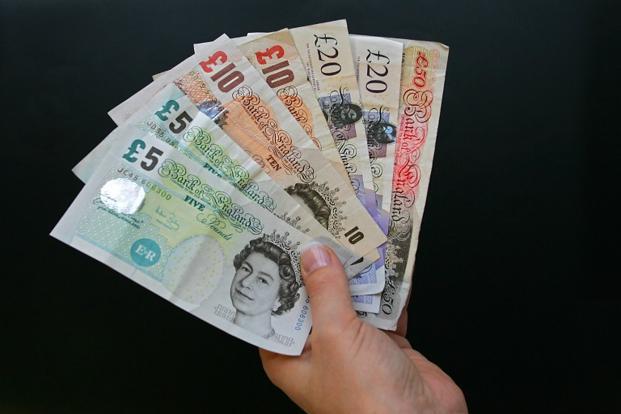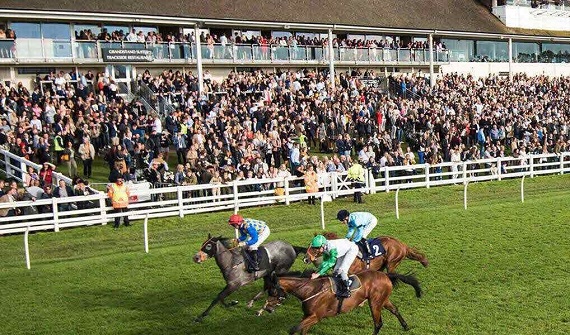British Racing has announced emergency financial support of £22 million to help its people, businesses and communities as they battle through the COVID crisis.
The suspension of racing has had a significant economic impact on racing yards, jockeys and the staff who look after horses.

Nick Rust
Racecourses have been particularly badly hit with no income at all from racing at present.
The new funding, and other measures, will offer help to those experiencing immediate hardship at all levels of the industry.
Nick Rust, Chief Executive of the British Horseracing Authority, said:
“This package of self-help funding offers some initial relief to the hard-working people, horses and businesses on whom racing relies. We know this does not solve the acute problems the industry is facing but it will provide much needed short-term assistance.
“We have an incredibly tough battle on our hands with an unprecedented collapse in income. More support will be needed and the most important way to achieve this will be through a safe resumption of racing when conditions allow. We have communicated this to government and are working hard with the other major sports to bring this about. We will be ready to resume racing and our plans are progressing with urgency.”

Racing’s main charity, the Racing Foundation, which holds the proceeds from the sale of the Tote in 2011, and the Horserace Betting Levy Board have stepped up with a substantial package of grants and loans. It is based on an urgent assessment of immediate needs across the sport agreed by the leadership of racecourses, horsemen and the BHA.
The Funding Package
- Tackling immediate hardship
One immediate target for the funding package will be the sport’s Racing Welfare charity which provides hardship payments to people who have worked in the racing and breeding industry. The charity was set up by the Jockey Club in 2000 and normally helps more than 2000 people a year. It has seen calls to its 24/7 support line go up significantly in recent weeks. It has been given additional funds of up to three-quarter of a million pounds by the Racing Foundation and the John Pearce Foundation which will support an anticipated upsurge in hardship payments.
- Supporting jockeys and the self-employed
Most of the sport’s jockeys are self-employed and normally rely on the fees they receive for riding in races up to 7 days a week in busy periods. Whilst some can maintain some proportion of their income by riding horses in training, for most there is the prospect of a significant gap until they can receive any money from the government’s scheme to support the self-employed. In addition, it is estimated that up to 35% of the self-employed professional jockeys may not be eligible for government help.
The Professional Jockeys Association, which represents the interests of the sport’s professional jockeys, will be given access to nearly two million in funds to provide a mixture of loans and grants to support professional jockeys, agents and valets. The PJA, in partnership with the Injured Jockeys Fund, has also created a specific Jockeys Hardship Grant Fund and both organisations have set aside a significant six figure sum from their own funds, matching the grant funding from the Racing Foundation, to assist jockeys with immediate hardship issues.
- Supporting training yards, stable staff and the welfare of horses
Though racing – and its related income – has been suspended, thousands of racehorses in training still require daily care and exercise. As a result, it has not been possible for trainers to place many staff on the government-funded furlough scheme. Furloughed workers cannot look after horses. The NTF estimates that around 80% of stable staff are still working.
Stable staff should benefit from a scheme to allow trainers to apply for loans to help pay their wages until government support payments are made. The National Trainers’ Federation put forward the plan after concern about the gap in receiving money from the Job Retention Scheme for those staff who have been furloughed.
A new industry scheme – the Racing Relief Fund – will be led by the Racehorse Owners Association to meet the welfare needs of horses whose owners are suffering financial hardship. Supported by the Racing Foundation, this alone will provide up to £2.5 million of grants to assist with the costs of looking after horses, in racing stables and in rehoming centres.
- Supporting racecourses
The sport’s 59 racecourses are well-known local landmarks across the country, generating valuable revenue for neighbouring businesses through the many visitors to traditional race meetings. Some smaller courses have been especially badly hit, losing their biggest meetings of the year over Easter and are now facing the prospect of a long period before the crowds can return.
All racecourses will be able to take loans from a £7.5m fund jointly established by the Levy Board and the Racing Foundation and have money advanced for fixtures due later in the year. This is intended to keep courses going until racing resumes, most likely behind closed doors, with significantly reduced revenues.

The Levy Board is also working with the industry to assess the costs of resuming racing behind closed doors when revenues are expected to be significantly below normal levels. The HBLB is setting aside substantial reserves to support prize money as racecourses are not expected to be able to fund their normal contributions in full. With racing suspended, there is no Levy income at present so resources will be required to assist the sport to get up and running when that is possible.
Comments from racing’s leaders included the Chief Executive of the RCA, David Armstrong, who commented:
“Our Member’s big festivals and major races are amongst the most popular events in sport and we know the public is missing them badly. But smaller, often rural courses are just as important a part of an industry worth more than £4 billion to the British economy. Their revenues from racing are zero right now and significant fixed costs continue so we are grateful for the support in this package. However we know we’ll need more support from the Levy Board as we move towards resumption and have a clearer picture of the long‐term impact on racing.”
The Chief Executive of the Racehorse Owners Association, Charlie Liverton, said:
“Racing’s leaders want to act as quickly as possible to protect livelihoods and address hardship. Make no mistake, there are people struggling who need our help. We hope this funding will go a long way to supporting the most vulnerable. We also support the Levy Board’s decision to ensure that there is enough money still available to get racing back on its feet once we resume.
“People across racing, including many owners, are currently facing significant financial challenges whilst continuing to maintain payments. They need the prospect of racing activity and prize money to support their costs and get the sport moving again. We would like to thank trainers and everyone else who have worked so hard to ease costs and care for horses in these most trying of times. For us and the industry, it is the return of racing, when it is safe to do so, that we look forward to.”
The Chief Executive of the National Trainers’ Federation, Rupert Arnold said:
“Racing provides a livelihood to jockeys, trainers and stable staff, and horse welfare is best protected through the care that they receive in trainers’ yards. We are all appreciative of the safety net that the HBLB and Racing Foundation has constructed with the package of loans to help immediate cash flow and grants for emergency hardship and safeguarding horses. Most importantly, we need to resume racing as soon as possible because that is what drives revenue and owners’ investment, which sustains us all.”








